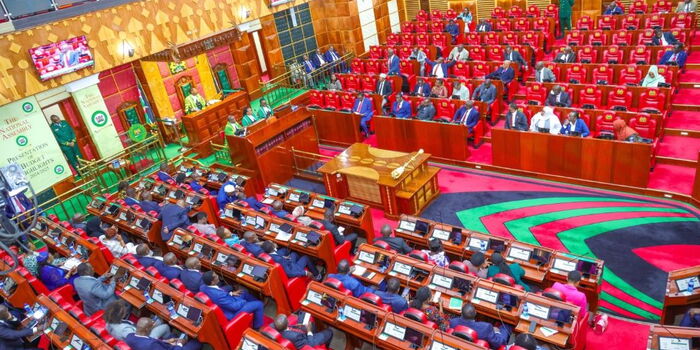
The High Court has ruled that the National Government Constituency Development Fund (NG-CDF) is unconstitutional. The court cited its detrimental impact on the principle of devolution. The court’s decision was delivered by a three-judge bench.
It highlighted that the fund created an unnecessary layer of bureaucracy. This led to the misallocation of public resources. The judges emphasized that the NG-CDF Act, as amended in 2022 and 2023, undermined the intended structure of devolution. It also duplicated existing government functions.
In their ruling, the judges pointed out that the NG-CDF’s operation violated the doctrine of separation of powers. It involved Members of Parliament in its implementation. This involvement was deemed unconstitutional as it disrupted the balance of power among government branches.

Photo
Parliament
Furthermore, the court noted that the fund established a parallel development unit. This unit operated independently of the counties. This contravened constitutional principles about devolution.
The court has mandated that all ongoing projects funded by the NG-CDF be allowed extra time for completion. A deadline is set for June 30, 2026. After this date, the fund and its activities will cease.
The ruling also stated that the petition was filed in the public interest. Hence, each party involved would bear its own legal costs. This decision follows a challenge brought forth by the Katiba Institute in 2016. They argued that the NG-CDF Act violated key constitutional principles.
The court’s declaration marks a significant shift in the governance of public funds in Kenya. It reinforces the importance of adhering to constitutional mandates about devolution and the separation of powers.
The ruling is expected to have far-reaching implications for how development funds are managed and allocated in the future. It will make sure that they align with the principles of accountability and transparency in public finance.








White Inner Three-Layer Polyethylene Pipes for Clean Water (Food Grade) in Iraq ElitePipe Factory in Iraq offers the highest quality white inner three-layer polyethylene pipes, specifically designed for clean water and food-grade applications. These pipes are manufactured using advanced technology that ensures the safe transport of drinking water, meeting strict international health and hygiene standards. The unique three-layer design enhances both durability and flexibility, allowing the pipes to withstand internal pressures while ensuring a longer lifespan. With a smooth inner surface that prevents the accumulation of impurities, ElitePipe’s food-grade pipes are ideal for various industries that prioritize safety and cleanliness. ElitePipe Factory, known for its innovation and dedication to quality, has solidified its reputation as one of the best and most reliable pipe manufacturers in Iraq. Whether it’s for municipal projects, private infrastructure, or industrial water systems, ElitePipe’s three-layer polyethylene pipes provide unmatched performance and peace of mind. Explore more about their product offerings at elitepipeiraq.com.
На mirtinvest.ru тебя ждут более 40 надёжных МФО, которые выдают микрокредиты на карту онлайн без отказов! Для всех от 18 лет, с минимальными требованиями и ставкой не более 0,8% в день — это твой шанс получить деньги быстро и без стресса. Мы работаем только с лицензированными компаниями, так что можешь быть уверен в безопасности сделки. Оформляй займ прямо сейчас и забудь про финансовые сложности!
Кредиты онлайн на карту за минуту. МФО 2024 предлагают займы без проверок и отказов.
Нужен быстрый займ без переплат? Экспресс-займы под 0% — это отличная возможность для новых клиентов. На нашем портале собраны самые выгодные предложения от микрофинансовых организаций, которые предоставляют займы на карту без процентов и скрытых комиссий. Это идеальный вариант для тех, кто оформляет микрозайм впервые и не хочет переплачивать. На странице вы сможете ознакомиться с актуальными предложениями 2024 года и быстро выбрать оптимальный вариант, чтобы получить деньги без переплат и долгих ожиданий. Оформите займ под 0% уже сегодня!
На mirtinvest.ru представлена подборка из более 40 лицензированных микрофинансовых организаций, предлагающих микрокредиты на карту онлайн без отказов. Все компании соответствуют законодательным требованиям, а максимальная процентная ставка не превышает 0,8% в день. Минимальные требования к заемщикам и доступность для лиц от 18 лет делают этот сервис оптимальным решением для быстрого получения финансовой поддержки. Выберите подходящее предложение и получите деньги на карту в кратчайшие сроки.
Наша компания Baikal-Wheels предоставляет эксклюзивные кованые диски на заказ и диски колесные купить в ярославле которые славятся прочностью и легкостью, улучшающей динамические характеристики автомобиля. Приобретая продукцию в компании Baikal-Wheels, вы получаете не только проверенные изделия от лучших производителей, но и превосходное обслуживание с удобной доставкой прямо к двери.
Хватит терпеть отказы! На mirtinvest.ru вы найдёте лучшие микрофинансовые организации, которые одобряют займы на карту без звонков и проверок. Вам понадобится только паспорт и именная банковская карта. Мы уверены в высоком одобрении — 90% заявок получают положительный ответ, а сумма займа может достигать 30 000 рублей. Забудьте про сложности — с нами получить деньги просто и быстро!
Ищете займ без переплат? На нашем портале представлены лучшие предложения микрокредитов под 0% для новых клиентов. Это уникальная возможность получить деньги на карту, не заплатив ни рубля сверх суммы займа. Такие предложения особенно популярны среди новичков, которые впервые обращаются в МФО. На странице собраны все актуальные микрокредиты под 0%, условия их получения, а также нюансы, которые стоит учесть при оформлении. Быстрое одобрение, отсутствие процентов и возможность вернуть деньги без переплат — вот что ждет вас при выборе этих предложений. Оформите свой первый займ прямо сейчас!
Реальная возможность получить [url=http://images.google.co.ve/url?sa=t&url=https://all-credit.ru/zaim-bez-otkaza-na-kartu/]займы без отказа на карту срочно [/url] даже при плохой кредитной истории. Мгновенные решения без проверок.
Сегодня для успешного продвижения бизнеса в онлайн-среде просто создать сайт уже недостаточно. Важно, чтобы он находился на первых местах в поисковых системах. Digital агентство ПАРОВОЗ уже более десяти лет занимается [url=https://seo18.su/]поисковое продвижение сео[/url] гарантируя компаниям постоянный поток клиентов. Мы приглашаем на тестовое предложение, в рамках которого вы сможете проверить наш профессионализм и ощутить результаты на практике.
Секрет нашего успеха — это внедрение современных технологий и высокий профессионализм. Мы не просто поднимаем посещаемость сайта, а предлагаем [url=https://seo18.su/]сделать сайт лендинг цена[/url] которое включает оптимизацию ссылок, накрутку поведенческих факторов и повышение мест в топе Гугл и Яндекс. Если вы хотите, чтобы ваш сайт стал источником прибыли, время действовать — с каждым днем рынок становится плотнее.
Когда срочно нужны деньги, онлайн-займы станут вашим спасением! Получите займ на карту за считанные минуты [url=https://itacat.ru/]мфо дающие по всей россии[/url] . Оформление максимально упрощено: возраст от 18 лет, паспорт — и вы уже можете рассчитывать на моментальное одобрение [url=https://itacat.ru/]малоизвестные мфо на карту[/url] . Даже если у вас плохая кредитная история, это не преграда! Наши партнёры предлагают займы без отказа без проверок и лишних вопросов [url=https://itacat.ru/]топ мфо без отказа[/url] . Сумма займа от 1 до 30 тысяч рублей, моментальный перевод на карту, и вы снова управляете своей финансовой ситуацией!
[url=https://mikro-zaim-online.ru/]мфо без залога[/url]
[url=https://mikro-zaim-online.ru/]онлайн займ под 0 процентов для всех[/url]
Воспользуйтесь услугой [url=https://dpmplus.ru/]руководитель девелоперского проекта обучение[/url] от DPM+ и получите знания, необходимые для создания успешных проектов. Мы предлагаем современную программу обучения, которая сочетает в себе теорию и практику, чтобы вы могли применять полученные знания на реальных примерах. Присоединяйтесь к DPM+ и откройте для себя мир новых возможностей в девелопменте!
[url=https://all-credit.ru/zaim-bez-otkaza-na-kartu/]Займы на карту онлайн без отказа[/url] на любую сумму до 30 000 рублей. Без лишних документов и проверок – деньги моментально на вашей карте.
Когда нужны деньги прямо сейчас, [url=https=https://все-займы-тут.рф/]микрозаймы онлайн без отказов[/url] — это то, что надо. Получил займ за несколько минут, и все просто!
Выбирай оригинальные [url=https://uggs-russia.com/]угг[/url] для уютной зимы – стиль и комфорт всегда рядом.
Выбирай оригинальные угги от UGG, покупай на [url=https://uggs-russia.com/]официальном сайте[/url].
На euroshop18.ru можно приобрести кухонные системы сайт с гарантией качества. Подробные описания товаров и удобная система заказа делают процесс покупки простым и быстрым. Не упустите выгодные предложения!
Микрозаймы без отказа всем
Деньги без лишних вопросов! Микрозаймы без отказа доступны круглосуточно, с 18 лет. Одобрение гарантировано, независимо от кредитной истории.
Анализируя рынок кухонной техники, можно отметить, что на euroshop18.ru представлены лучшие модели газовая варочная панель купить . Потребители отдают предпочтение этому магазину благодаря широкому выбору и надежности поставщиков, что подтверждается их длительным присутствием на рынке.
Срочно нужны деньги? Получите до 30 000 рублей мгновенно! Оформите займы онлайн срочно и получите деньги на карту за считанные минуты.
Быстро займы на карту без отказа
Оформление перепланировки может быть сложным процессом. Мы предлагаем узнать стоимость согласования перепланировки помещения в Москве и воспользоваться услугами наших специалистов для оперативного узаконивания проекта.
Получите займы на карту до 30 000 рублей даже с плохой кредитной историей. Наша подборка МФО работает круглосуточно, перевод денег мгновенный!
Оформить изменения в помещении – просто! Узнайте, [url=https://potolki-kitstroy.ru/]стоимость согласования перепланировки[/url] у наших специалистов. Мы предлагаем разумные цены и поддержку на всех этапах оформления проекта.
Оформите быстрые микрозаймы без отказов и проверок онлайн и получите деньги моментально на любую карту без звонков и сложных проверок. Займ доступен круглосуточно!
Узнайте, где предлагают МФО с выдачей мгновенным займов для всех. Быстрая заявка и моментальное получение денег на карту!
Кредит на карту без проверок и звонков мгновенно — займы от новых МФО с моментальным одобрением и переводом на карту. Выгодная ставка всего 0.8% в день!
Займы без отказа с плохой кредитной историей доступны тем, кто не может получить кредит в банке. Оформление онлайн и моментальное одобрение без сложностей.
Ищешь надежную платформу для ставок? Леонбет — твой выбор! Здесь ты найдешь всё для успешных ставок на спорт. Простота использования и высокие шансы на выигрыш ждут тебя на каждом шагу.
autism-mmc.com is a leader in Asperger’s syndrome offering personalized care for all ages. Whether addressing early Mardaleishvili Cord Blood Bank in children or supporting adults, our proven approach leads to real progress. Start the journey to a better future today.
Компания OknaAlum предлагает высококачественные алюминиевые окна, которые сочетают современный дизайн и долговечность. Продукция отличается отличной тепло- и звукоизоляцией, устойчивостью к коррозии и лёгкостью в уходе. На сайте oknaalum.ru вы можете узнать больше о наших окнах и выбрать подходящие для вашего дома варианты. Установка окон от OknaAlum — это не просто инвестиция в комфорт, но и в долговечный стиль вашего жилья.
Профессиональная установка окон — это не просто работа, а дело, которое мы в OknaAlum выполняем с удовольствием и ответственностью. Наши специалисты знают все тонкости установки и делают всё, чтобы окна служили долго и надёжно. Зайдите на oknaalum.ru, чтобы узнать, как мы работаем, и почувствуйте заботу о каждом этапе. Мы рядом, чтобы ваши окна радовали вас долгие годы!
Мы собрали более 30 проверенных МФО, чтобы каждый с 18 лет мог оформить займ без процентов на карту. Первый займ под 0%, минимальные требования — только паспорт. Суммы от 1 до 30 тысяч рублей, быстрый перевод средств и возможность улучшить свою кредитную историю при своевременном возврате.
Фильмы приключения kinosklad.net
Хотели найти сериалы онлайн зарубежные в интернете, это к нам. Также на почти все фильмы гости нашего сайта написали отзывы, можете их прочитать, а также написать собственный. Желаем эффектных картинок, чистого звука и интересных историй.
Лучшие зарубежные сериалы kinonix.net
Планировали смотреть лучшие фэнтези прямо сейчас, тогда заходите на kinonix.net и желаем Вам отличного просмотра. Гораздо комфортнее, когда все фильмы собраны в одном месте, чем разыскивать каждый раз посторонние видео плееры для очередного кино. Смотрите сами, приглашайте друзей и детей к просмотру.
Срочная доставка роллов Иркутск sushi-holl.ru
Если Вы искали роллы иркутск доставка недорого круглосуточно на дом в сети интернет, то вы попали в точную цель. Здесь самые свежие и вкусные суши по самым удачным ценам в городе. Мы расположены по адресу: г. Иркутск, ул. Пискунова, д. 146. Режим работы с 10:00 до 22:05. Приходите, звоните, делайте заказ и приятного аппетита, наш дорогой гость!
Вы когда-нибудь чувствовали, что находитесь в шаге от победы, но не знаете, какой сделать ход? Совет по покеру — это именно то, что поможет вам уверенно преодолеть любые сомнения. Этот надежный инструмент превращает даже самые сложные решения в понятные шаги к успеху. С ним вы больше не будете бояться ошибиться, ведь каждый совет — это ваша уверенность за столом!
Для успешной игры в покер важно принимать точные и обоснованные решения. Покерная подсказка станет вашим надежным инструментом для анализа игровых ситуаций. Она помогает рассчитать вероятности, понять действия соперников и выбрать оптимальную стратегию. Этот инструмент подходит как новичкам, так и профессиональным игрокам, предоставляя необходимую поддержку для уверенной игры за столом.
7f7b84
Покер становится не просто игрой, а ареной для интеллектуальных баталий, где выигрывают только самые подготовленные. NZT покер — это современное решение, которое помогает игрокам выйти на новый уровень. Благодаря передовым алгоритмам и аналитическим инструментам, NZT предлагает уникальные возможности для оптимизации стратегии. Неважно, новичок вы или профессионал, этот инструмент станет вашим проводником в мире сложных игровых решений и увеличит ваши шансы на победу.
Если вам нужно оборудование для больших объемов снега, обратите внимание на снегоплавильня 200 м3 мобильная цена. Это мощное устройство идеально подходит для работы на крупных объектах, таких как аэропорты, строительные площадки и промышленные зоны. Мы более 10 лет создаем надежное оборудование, которое помогает справляться с самыми сложными задачами. Мобильная снегоплавильня обеспечивает удобство транспортировки и высокую производительность.
Reliable HVAC Repair Services https://serviceorangecounty.com stay comfortable year-round with our professional HVAC repair services. Our experienced team is dedicated to diagnosing and resolving heating, cooling, and ventilation issues quickly and effectively.
Бандикам порно пары — отличный способ узнать, что же там снимают настоящие энтузиасты! Живое шоу, натуральные эмоции и никакого монтажа. Это как кино, только лучше: всё здесь и сейчас, без дублей.
https://cse.google.fi/url?q=https://rt.livesexcams3.com/
http://cse.google.am/url?sa=i&url=https://rt.livesexcams3.com/
https://maps.google.pn/url?q=https://rt.livesexcams3.com/
Taya365 ensures convenience for Filipino players with quick and secure transactions via popular methods like GCash, Bitcoin, and Ethereum, catering to modern gaming preferences.
taya 365 taya365 .
Нуждаетесь в оптимальный вариант быстро получить деньги? Проверенные организации предоставляют займ онлайн на карту без дополнительных формальностей с минимальными требованиями. Для оформления достаточно — паспорт и банковская карта. Лучшие МФО обещают положительный результат всем от 18 лет, даже если у вас плохая кредитная история. На сайте mikro-zaim-online.ru доступен топ предложений выгодных решений. Микрофинансовые займы доступны круглосуточно, а ставка может составлять от 0% и ограничена 0.8% ежедневно. Оформите займ за 5 минут, заполнив анкету через Госуслуги.
Займ на карту без отказа — это доступный способ управиться с денежными вопросами срочно и без проверок. МФО предоставляют микрозаймы под 0%, с более привлекательными условиями, чем в банках. Ряд организаций разрешают продления займа, если вовремя вернуть его не удается. Положительное решение почти обеспечено практически каждому, а деньги поступают на карту моментально. Это просто, эффективно и безопасно, ведь вы взаимодействуете с легальными организациями.
Подобные займы на карту без отказа идеальны для тех, кто нуждается в срочных средствах. Например, для оплаты счетов или разных ситуаций. Оформление максимально быстрое — никаких справок о доходах и звонков. Используя онлайн-платформы, вы можете оформить микрозайм круглосуточно и быть уверенными в положительном ответе. Испытайте удобство онлайн-кредитования и подберите идеальный вариант!
Как выбрать коляску 3 в 1: советы и рекомендации, на которые стоит обратить внимание.
Топовые модели колясок 3 в 1, с комфортом и безопасностью для малыша.
Гид по выбору коляски 3 в 1, для того, чтобы учесть все нюансы.
Секреты удачного выбора коляски 3 в 1, для максимального удобства вашего малыша.
Плюсы и минусы популярных моделей колясок 3 в 1, и сделать правильное решение.
balios s lux 3 in 1 https://kolyaska-3-v-1-msk.ru/ .
Лучшие букеты роз для вашего праздника, насладитесь красотой и ароматом.
Индивидуальные букеты роз по вашему желанию, профессиональный подход к каждому клиенту.
Уникальные букеты роз от лучших флористов, оперативная доставка в любую точку.
Изысканные букеты роз от профессионалов, доставка в день заказа.
Изысканные композиции из роз, почувствуйте аромат настоящей любви.
Соберите свой уникальный букет роз, круглосуточный сервис для вас.
Оригинальные идеи для букетов роз, индивидуальный подход к каждому клиенту.
Выберите свой идеальный букет роз, удобные способы оплаты.
Красочные композиции из роз разных сортов, поможем выбрать идеальный вариант.
Закажите свой уникальный букет роз, и вы будете в восторге.
Букеты роз – это всегда актуальный подарок, в удобное для вас время.
Прекрасные букеты роз для ваших близких, сделайте день особенным.
красивый букет роз красивый букет роз .
Join Taya365 to experience Filipino gaming at its best. Whether you’re a seasoned player or a beginner, the platform offers tailored promotions, a vast game selection, and robust security measures.
taya 365 taya365 .